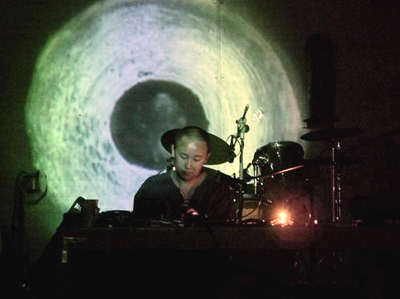You're sitting in a busy parking lot on a wet day. Vehicles come
and go. You hear car engines, windshield wipers, opening and
closing doors. What words do you have to describe all these sounds?
For Mark Ballora, an assistant professor at Pennsylvania State
University's School of Music, the words are "great music." It's
that simple!
|

Yan Jun
|
The American musician was in Beijing last week at MusicAcoustica
2006. At the event Ballora and his wife Wang Agatha Jui-Chih played
a piece in which the sound of a flute was processed on a computer.
The instrument with the special effects made a "super flute" as
Ballora termed the combination.
The super flute produced electroacoustic music... a term
described by Ballora as music that's produced by processing
acoustic sounds with electronics. The super flute was just an
example as was the "parking lot" music. Ballora said every acoustic
sound had rhythms with it and his works found inspiration in all of
them.
The same passion for sounds is shared by Beijing's Yan Jun, a
former rock music critic, who now finds greater pleasure in the
field of "sound-art".
Yan Jun loves to record sounds. He does it in the way film
directors shoot documentaries with the same idea of chronicling
reality. He says there are just too many sources for great sounds
-- insects, birds, water, cars, construction sites, thunder and
snoring to name but a few -- and that some acoustic sounds
were beautiful art in themselves. It's always amazing how new
sounds can be created by editing original recordings with the help
of easy-to-use computer software such as Garageband and
Wavelab.
Here lies the beauty of electroacoustic music--its apparent
capability to spark creation and imagination. Using different
techniques on one piece of sound two separate artists are able to
create something absolutely different. Even the same piece of
electroacoustic music gives each listener a different feeling.
There seems to be no concrete messages from musicians. Ballora
and Yan Jun say they focus on the sound itself rather than the
audience so you can literally assume the music is about anything
that comes to your mind.
At this point you may be asking yourself, "If making
electroacoustic music is as easy as recording sounds around me and
playing them with a computer can I also become a musician?" Both
Mark Ballora and Yan Jun's answer a resounding "yes!" You can do it
and do it well with an indispensable passion for it. Ballora said
currently there are all kinds of people enjoying themselves in this
field ... with and without a musical background or technological
training. A personal interest is, above all, the best teacher.
There's no better time to jump on the bandwagon with easy-to-use
music software and simple-to-follow demonstrations. Yan Jun runs
several weekly events for experimental musicians in Beijing. For
instance there's "One Plus" every Thursday at the D-22 bar. It
introduces a "sound art" musician each week to fully showcase his
or her talent. The door is wide open to all upcoming entertainers,
says Yan Jun.
(CRI November 1, 2006)